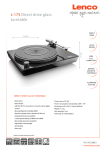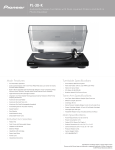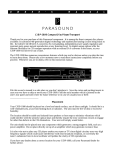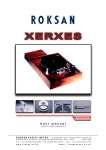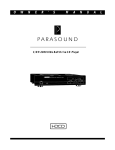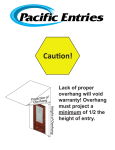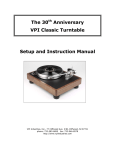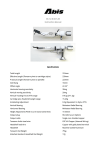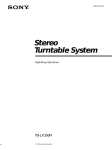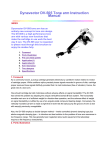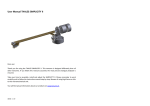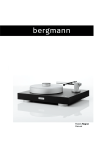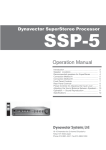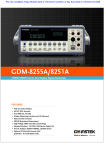Download 507mk2_emanual_v1.
Transcript
Dynavector DV507MKII Tonearm Instruction Manual DV507MKII Instruction Manual 1. Introduction Thank you for your purchase of the DV-507MKII tonearm. DV507MKII is a high-performance tonearm with many advanced features, which enable it to transmit signals on the record precisely through a cartridge. The original mass-separation or 'bi-axis inertia' arm was the 505. The 507 MKII is the latest development of that revolutionary design with greatly enhanced performance and ease of use thanks to a major redesign. Correct installation, set-up and operation are important to provide the best sonic performance. Please read this instruction manual carefully before attempting installation and use. 2. What is the bi-Axis inertia controlled tonearm. The tonearm is required to fulfill two functions so that the cartridge can reproduce the exact signal from the record groove. One of these is to hold the cartridge stationary at audible frequencies so that the stylus and cantilever motion is translated into a music system without losses. The other is to allow the cartridge to track warped records. These require totally contradictory properties from the tonearm and so all conventional tonearms are a compromise between the two. However, a very reasonable solution exists in the bi-axis tonearm. The bi-Axis inertia control tonearm is in effect two arms in one - the main arm beam has an effective-mass that is 3 or 4 times higher compared with conventional tonearm but moves only horizontally. On the other hand, the sub-arm has a lower effective-mass than any conventional tonearm but moves only in the vertical direction. This combination means that the high effective-mass in the horizontal direction holds the cartridge steady at audio frequencies, especially at low frequencies and high groove excursions, whilst the low vertical effective-mass allows unmatched warp riding performance. The DV507MKII has unique, non-contact, electro-magnetic damping system that requires no maintenance or adjustment unlike the usual oil damping system. With the new MK11 this damping is further enhanced by the use of neodymium magnets. 3. Parts identification main weight balancing scale anti-skating divice main weight stopper arm rest main arm damper plate arm head damper magnet main base sub weight sub arm bar headshell sub arm height adjusting lever arm lift tracking force adjuster 4. Mounting to the turntable Use the supplied mounting template for the DV507MKII. Drill a 30mm diameter hole on the arm board of the turntable 226 mm away from the turntable spindle center. Temporarily place the tonearm into to this hole. Adjust the angle of the tonearm by rotating the arm base of the tonearm in the hole so that the desired position of the tonearm at rest is achieved. Once found mark this position with a sharp point through the three arm-base mounting holes. Drill these holes as appropriate for the supplied woodscrews or bolts and fix the base to the turntable. 5. Connection of the arm cable The tonearm cable supplied is designed to the highest specification, with a double-balanced, shielded cable and 4N OFC/6N. This cancels potential difference between right channel and left channel giving the best possible transmission of the signal. Insert the 5-pin plug of the tonearm cable into the output connector of the tonearm and connect the RCA plugs of the tonearm cable to the input of the phono stage or the pre-amplifier. 6. Alignment and operation Please check and adjust the each part according to the following procedures before fixing the cartridge to the headshell. 6-1. Damper plate check Very strong lines of flux run in the gap between the damper magnets. An eddy current produced when the damper plate passes through this gap acts as a dynamic damper to reduce arm resonance. Rotate the main arm right and left gently and check that the main arm rotates smoothly while the damper plate passes through the gap without touching with damper magnets. We carefully assembled the damper plate to rotate smoothly, if there is any physical contact between plate and magnets at all, please return the tonearm for repair to your local dealer or Dynavector distributor as this could seriously damage your cartridge. 6-2. Mounting the cartridge a) Mount the cartridge onto the headshell supplied. Use good quality M2.5 or M2.6 screws supplied by the cartridge manufacturer and do not tighten them fully before overhang alignment has been completed. The connection of the leads should be done according to the instruction manual of the cartridge. b) Overhang alignment Overhang is the distance from the spindle center of the turntable and the stylus tip of the cartridge when the tonearm is rotated over the spindle. The overhang of 15mm has been designed on the 507MKII so that minimum tracking error is at the inner track of the record. NOTE: You can easily check the overhang by using the mounting gauge supplied - see above, which fits between headshell and arm. When the stylus rests on the zero point then overhang is perfect. The inner null point and the outer null point on the mounting template is correct when the overhang alignment is set using this gauge. c) Azimuth adjustment Check the cartridge seen from the front. It should be perpendicular to the record. The azimuth can be easily adjusted on the headshell we supplied - simply loosen the socket head screw located on the side of the headshell. NOTE: If the overhang or the azimuth adjustment is not correct, it will cause tracing distortions. 6-3. Mounting the headshell to the tonearm. Use the stylus guard to avoid accidental damage. 6-4. Main weight adjustment DV507MKII is essentially two arms on one. The heavy and rigid main arm moves only in a horizontal direction and does not effect the VTF (Vertical Tracking Force) of the cartridge - however there is an adjustable balance weight so that the bearings are evenly loaded to reduce friction and bearing ‘chatter’. There is then a choice of three small weights used to balance the cartridge on the sub arm - A, B or C. The position of main arm weight is dependent on the total mass of the cartridge and headshell, and on which small counterweight is used on the sub arm. First calculate the total weight (headshell weight + cartridge weight). After that you should choose suitable sub-weight according to the following table. Total weight 15 - 23 g 20 - 33 g 25 - 35 g Type of the sub weight A C B The weight of the Dynavector headshell : 15.4 g At the pivot end of the main arm you will see marked a series of scales, three in all and each corresponding to one of the three sub-weights. E.g. When the total weight is 20g and you use sub weight A, you should adjust the front end of the main weight to line up with the 20 above the ‘A’ printed on the arm - see picture. NOTE: This adjustment is not super critical if the turntable and arm are level (as they should be). 6-5. Vertical Tracking Force (VTF) adjustment Place the correct sub-weight onto the sub arm. Please note the screws of the sub-weight should face toward you. (1) The VTF dial should be adjusted to “0g” point. (2) Balance the sub arm level by sliding the sub-weight forward and backward. (3) You can then adjust the VTF according to the cartridge manufacturer’s specification using the VTF dial. (4) Adjustment range of the VTF is between 0.5 g and 3.0 g in 0.2g steps. You will find whilst doing this that the mounting of the counterweight stub is flexible, this is deliberate and a feature that is designed to reduce resonances in the arm 6-6. Arm height (VTA) adjustment (1) Adjust the arm height approximately by loosing the height adjustment screw on the side of the arm mount and sliding the whole arm up or down. (2) Tighten the height adjustment screw. (3) Loosen the height adjustment lever by turning anticlockwise. (4) You can then adjust the arm height more precisely by moving the height adjustment lever left and right. (5) Set the cartridge on the record and set arm height so that the headshell top is parallel with the surface of the record by moving the height adjustment lever. (6) Lock the lever to the optimum position by turning the lever clockwise - do not overtighten, simple finger pressure is enough. (7) 7 mm of height adjustment is available using this lever - larger changes should be done using the height adjusting screw. 6-7 Anti-skate adjustment Normally the anti-skating dial should be set to the same value as the tracking force. However actual requirements are dependent on a number of variable factors such as the shape of the stylus tip or record material itself. When you use a cartridge with a line-contact stylus, you will get better results by increasing the anti-skating force a little. If you notice left channel mistracks, reduce the setting, and if you notice the right channel mistracks, increase the setting. NOTE: The dial can be operated while playing the record. 6-8. Arm lift (cueing device) The silicone oil dampened tonearm lift is provided. (1) To lower the stylus onto the record Position the tonearm so that the stylus is over the record groove and lower the arm lift lever carefully. (2) To lift the stylus from the record raise the arm lift lever carefully. NOTE: When lowering the stylus onto the record, the cueing point may drift a little toward the outer groove of the record. This is because of anti-skating force, it is not defect with the arm lift. u All adjustments and setting are now completed. DV507MKII is designed to be maintenance free and there are no parts which will wear out under usual operating conditions. Please contact your local dealer or Dynavector distributor in your country in the event of any of the problems listed below. (1) The arm had been dropped or subjected to excessive shock. (2) Kept for a long time in a dusty condition. 7. Appendix We hope that with the aid of the instruction manual you been able to achieve correct adjustment and setting. Please note the following to keep the arm at the best condition. (1) Do not attempt to disassemble the arm. (2) Do not apply oil or other lubricant to any parts of the arm. (3) Keep the packaging for sending the arm for repair. 8. Specifications Type Bi-Axis inertia controlled Dynamic and Eddy-Current Damping Dynamic Balance type tone arm Overall length 306mm. With head shell: max 326 mm Effective length 241mm (i.e. tonearm pivot point to cartridge stylus point) Overhang 15mm Offset angle 21.5 degree Height 59mm lifts up to 92mm Height adjustment range 39mm-72mm at sub arm center Depth 36mm without connecting cable Optimum cartridge weight 15-35 grams, including headshell Horizontal tracking angle error -1.1 degree - +2.2 degree , 0 degree at inner band of record, 2.2 degree at outside Tracking force adjustment range 0-38 grams by 0.2 grams step Sensitivity Horizontal less than 50 mg, Vertical less than 40 mg Net weight 1,380 grams Output connection DIN 5P connector Headshell connection EIA standards 4 Pin connector Accessories low resistance (0.046 ohms/m, 54pF/m) high quality arm cable, milled aluminum headshell weight 15.4 grams. mounting template for the arm overhang gauge for the headshell This product can be recycled. Products bearing this symbol must NOT be thrown away with normal household waste. At the end of the product's life, take it to a collection point designated for recycling of electrical and electronic devices. Find out more about return and collection points through your local authority. The European Waste Electrical and Electronic Equipment (WEEE) Directive was implemented to dramatically reduce the amount of waste going to landfills, there by reducing the environmental impact on the planet and on human health. Please act responsibly by recycling used products. If this product is still useable, consider giving it away or selling it. 2-16-15 Chiyoda-ku Iwamoto-cho Tokyo 001-0032 Japan TEL +81 (0) 3-3861-4341 FAX +81 (0) 3-3862-1650












